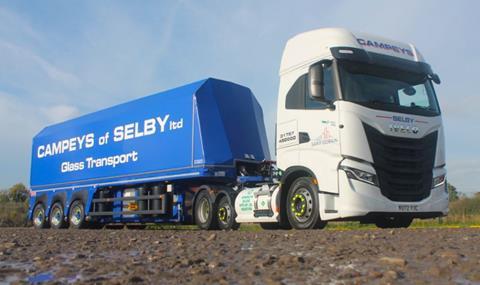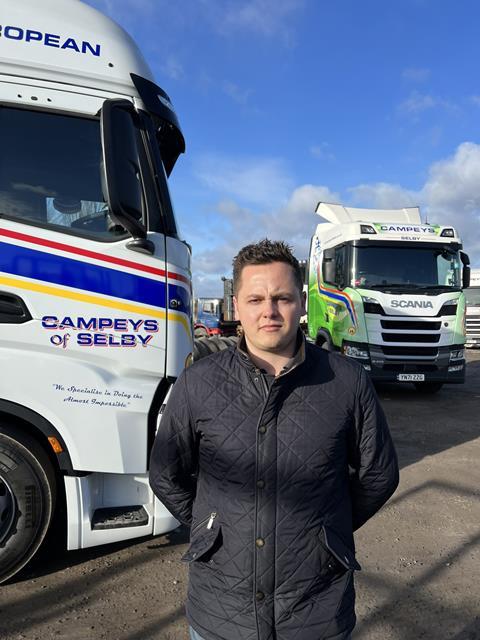Campeys of Selby made headlines in February 2023 when it became the first UK haulier to acquire a 19-tonne battery-electric DAF LF for its pallet network operation.

At the time, Harry Campey, commercial and operations director, admitted the vehicle was mainly to help build the company’s green credentials with customers.
“It may well be a loss-leader, but it will be a fantastic marketing tool, plus we are hoping it will both retain business and gain new business,” he said. “This is such an exciting time, and there’s so much happening. It’s so opportunistic, and you have to be forward-thinking and forward-looking, and make the most of the new technology.”
The electric truck follows in the footsteps of 12 CNG tractor units that Campeys started acquiring back in 2021 and Campey now says: “Sustainability is the future. Without those options we will get left behind. It gives us that commercial leverage and advantage with customers because the end consumer is questioning supply chains and what their global emissions are.
“When we get a tender now the first two questions are name and address and the third question is ‘what is your GHG and sustainability policy?’
“We have to get onboard with that. We will not sit back and wait. If we try something and it doesn’t work we have learnt something, if it does work we have gained something. There is no such thing as a mistake.”
Campey is sceptical about the role of hydrogen in decarbonising road freight transport, citing inefficiency of converting renewable electricity into hydrogen and then back into motive power either in a fuel cell or internal combustion engine.
“By the time it gets to the wheels you lose 70% of the energy,” he argues. “Is hydrogen even sustainable and is hydrogen the answer? I’m not sure. Electric is the answer for return to depot, collection and delivery services. Is it the answer for long haul? Again I’m sure but we will see.”
Six of the Campeys fleet are rigids and so candidates for electrification, the other 120 trucks being tractors. “We could replace all the rigids with electric tomorrow with no issues,” he says. “Could we replace all the tractor units with CNG tomorrow? Probably not.
“With CNG we have two options – the Scania 4x2 or the Iveco 6x2. The Scania has better range while the Iveco can carry the weight. The Scania is a better product but Iveco has the only 3-axle product so they are getting silly with the prices. If someone came to market with a 3-axle CNG tractor we could probably in a year or 18 months switch the whole fleet. Refuelling infrastructure is getting better with 13 or 14 refuelling sites now and a couple more opening every year.
“But bioCNG is only a stepping stone, not the long-term solution.”
A lot of operators had to stand their gas trucks as the price of gas shot up after the Russian invasion of Ukraine but Campeys kept them running.
“We had to be more selective on what we did with them and kept them on more local work,” says Campey. “Currently they are 25% cheaper to run per mile so if we have a truck that does 3,500kms in a week we can be saving over £500 that week. Diesel has gone up 6ppl in the last three weeks whereas the gas is less volatile. So they are cheaper to run and we get a 90% CO2 saving.
“On the glass for example there are five hauliers working out of the factory but because we are the same price and they get the CO2 saving our trucks are the last to get parked up.”

At 27, Campey, pictured, is the fourth generation of the family in the business which was founded in the 1930s by his namesake, but explains that it was restarted between the second and third generations.
“My great grandad Harry Campey started H Campey & Sons,” he says. “My grandad [the founder’s youngest son] married the youngest daughter of Stan Robson [founder of haulier Robson’s of Carlisle]. By 2005 my grandad and his two brothers had got to retirement age and my grandad was working in another business he had so they were winding the company down.
“They got down to the last two trucks and my dad Paul thought ‘I don’t want to see the name disappear’ so in 2005 Campeys of Selby was born. He bought the last two trucks from my grandad and he and my mum Liz started again.”
Harry jnr joined the business age 18 in 2015 after a successful career racing karts and attending the Silverstone motorsport college with a view to a career in motor racing.
“I did two years there and got a job with a race team,” he says. “The team’s funding was cut mid-season just after Le Mans and my plan was to go home, get my Class 1 and with that and my racing experience I thought I would be more employable when the next season started.
“But I never left!”
Campey started out as a full-time driver, tramping all over the UK for four years, until he could no longer avoid the office as the business grew.
“I didn’t want to be a pen-pusher but we had a couple of planners off on holiday and my dad needed help in the office,” he says. “I never left there either!”
Having got his CPC at 20 he started working as a transport manager before progressing to commercial and operations director.
His rapid progress has been matched by the company’s growth, which has gone from 10 to 125 trucks in just 10 years. It’s motto is: “We specialise in doing the almost impossible!”
“The growth has come from not saying ‘no’ to anybody,” Campey smiles. “That is our motto. We always say ‘yes’ then ask ‘what is the question?’. We’ve grown with customers as they have grown and we have grown by going into different sectors.
“We started out in sheet glass transport with specialist trailers and that got us from two trucks to 10 before we went into curtainsider work. We still have 15 trucks on glass and the rest is general haulage including construction products like insulation.”
The latest new string to the Campeys bow was a move into refrigerated transport in November 2023, and it joined the Cold Chain Federation in February this year.
“We realised after Covid that we relied on construction a little too much,” says Campey. “When we went into lockdown all our delivery points closed and we had to fetch all the truck back. The glass stopped, the insulation stopped, but we had a couple of food and packaging customers who kept going so we knew we had to diversify.
“So last year we got a 30,000sq ft warehouse in Wakefield and have just got BRC accreditation for that.”
The first temperature controlled products in there were in fact flowers imported through Hull for distribution to supermarket RDCs.
“The flowers were our first opportunity to step into it but we will be going into food,” says Campey. “We have a dozen fridges on the fleet and 2,500 pallet space in the warehouse so nothing major but it is the first steps.
“We have put in a planning application for a second, 20-acre site in Selby which we already own. My grandfather has a lot of farmland and the whole site is 45 acres so we are putting in for planning for half of it. We want to build a 50,000sq ft to 75,000sq ft warehouse, a big loading canopy for the pallet network, workshop, offices and trailer park. That will be our forever home.
“Once the warehouse is full we can bolt on another 100,000sq ft on the side and grow on that site rather than have different sites.”
Campeys currently has five sites in East Yorkshire; its headquarters and Palletforce operation in Thorpe Willoughby near Selby, Howden near Goole, Wakefield and two at Eggborough near junction 34 of the M62.
“Howden is a customer site where we are the on-site 3PL, Wakefield is a warehouse with parking and the two at Eggborough are parking areas for trucks and trailers,” says Campey. “Because we have grown so quickly we have outgrown Selby.”
Campey says there will be a ready pipeline of new customers for the bigger warehouse.
“In Selby there are not a lot of storage options,” he says. “There are a couple of big manufacturers that currently store elsewhere. We already do the transport for them but we don’t have a warehouse solution yet.”
The Campeys fleet now includes over 125 trucks and 250 trailers and finding space to park them has become a constraint on further growth.
“That is why we have had to take on satellite sites,” says Campey. “The idea of the new site is to bring it all under one roof. At the moment we have inefficiencies as the pallet network staff at Selby are really busy 5am to 9am then they have nothing during the day until they get busy again from 3pm to 7pm.
“So we send lads in a van from there to Wakefield to help destuff containers. If we had it all on one site we could just run different shifts.
“We also need 3 acres of trailer parking and if we took that on an industrial park we would be £3m down and it doesn’t earn anything.”












![Konect62 Entrance Drone Photo 24.11.23 copy[80729]](https://d2cohhpa0jt4tw.cloudfront.net/Pictures/100x67/4/5/9/19459_konect62entrancedronephoto24.11.23copy80729_716628.jpg)

